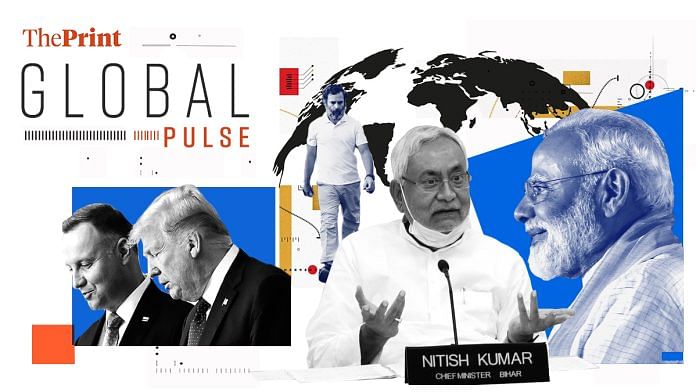New Delhi: Narendra Modi’s popularity can be credited to a large extent to his “ability to tell a story”, says The Economist in a report which analyses 110 episodes of Modi’s monthly radio show ‘Mann Ki Baat’ to understand its content and sentiment. Modi, it reads, “could reasonably claim to be the world’s most popular democratically elected leader”.
The piece, titled ‘Radio Modi: How India’s prime minister sweet-talks the nation’, goes on to add that Modi has “carefully cultivated” the image of being an “everyman” and in his radio show assumes a persona akin to that of a “friendly uncle” rather than the Prime Minister of India. It also says that India’s achievements in science, industry or sport dominate episodes, while “negative stories, such as riots or communal violence, are either referred to obliquely or ignored altogether”.
“For every 100 words, four are explicitly positive compared with 0.8 that are negative,” it says, adding that the word “inspiring” or some variation of it features “roughly five times per episode”.
It adds that, unlike his fiery rhetoric in rallies, Modi “adopts a more inclusive approach on radio” and also refrains from taking jibes at the Congress or using the show as an “overt tool for BJP campaigning”. It, however, says testing Modi’s claim that the radio allows him to reach every “corner” of India is “tricky because listening figures are hard to come by”.
The piece concludes thus: “By becoming the chief narrator of India’s triumphs, Mr Modi is increasingly seen as their architect. And he knows it.”
In a report in The New York Times titled ‘How A.I. Tools Could Change India’s Elections’, Suhasini Raj explores a ‘hyperpersonalised’ method of outreach being put to use in the Lok Sabha election campaign. This method uses artificial intelligence to create avatars of Modi and BJP’s local leaders, and chatbots to send WhatsApp messages to voters. In a country with nearly a billion voters, such a method saves the parties money and allows them to overcome linguistic barriers, it says.
While this may seem harmless, the report claims, it may get confusing for the voter to figure out the source of the content and whether it is authentic. Raj also spoke to Divyendra Singh Jadoun who operates an A.I. start-up, The Indian Deepfaker, and claims to have been hired by politicians to create content using open source AI. Both the BJP and Congress have accused each other of circulating deepfakes.
Highlighting a growing attraction for the BJP among youth and, a report in The Washington Post by Karishma Mehrotra and Gerry Shih also points to the trend of Indian women increasingly “voting independently from their husbands”.
Titled ‘As India votes, women and youth could put Modi and his BJP over the top’, the report credits social media for this change.
Over the last decade, Modi’s administration has implemented various initiatives targeted at women — free cooking gas connections, loans for women entrepreneurs, and training programmes for women. These efforts seem to have resonated with women voters, it says, adding however, that it is yet to be verified whether women are faring well under this government.
Young voters, the report says, are concerned about unemployment but have not necessarily linked it to the government and continue to support the BJP.
Despite enjoying a massive majority in India, the BJP has struggled to make inroads in one of the country’s wealthiest and most developed regions — the southern states. However, “this time around, the BJP is making its move”, Sanjai P.R. and Dan Strumpf note in a report for Bloomberg titled, ‘Modi Wants To Dominate India’s Election. One Region Stands In the Way’.
Over the past 10 weeks, Modi has visited Tamil Nadu seven times, where he strongly criticised the two prominent regional parties. Despite these efforts, there remains “distrust” in the south due to concerns over perceived unfair distribution of government revenue and fears of language dominance, it adds.
Nikkie Asia profiles key opposition leaders as India gears up for vote. It talks about Rahul Gandhi, a scion of the Nehru-Gandhi family dynasty and Congress leader, and his efforts to revitalize his party’s fortunes through extensive nationwide marches. Other leaders profiled include Mamata Banerjee, the chief minister of West Bengal and leader of the Trinamool Congress, who stands as a prominent figure in the opposition, ‘opposes’ the Modi government’s citizenship law, and M.K. Stalin, head of the DMK party and chief minister of Tamil Nadu, aligns with the opposition bloc, emphasizing regional identity and opposing any imposition of Hindi language. Nitish Kumar, the chief minister of Bihar, and his ‘turncoat’ politics were also noted by the Japanese news media.
In a report for DW titled ‘India election: Why are opposition members defecting to BJP?’, Shakeel Sobhan looks at the many reasons behind leaders from opposition parties defecting to the BJP just before the commencement of the general election. The report identifies Modi’s charisma, frustration with some political partners, and state pressure as among the reasons for these defections.
Also Read: BJP’s ‘ruthless efficiency’ in campaigning & how it’s leading the meme race
Polish President meets Trump, volcanic eruption in Indonesia
Indonesia’s Mount Ruang erupted as many as five times within a span of 24 hours, forcing widespread evacuation in the North Sulawesi Province. Read Al Jazeera’s report to know more.
Just a few months before the US elections and amidst a war in Europe, Poland’s right-wing president Andrzej Duda met with former US president and now-Republican presidential candidate Donald Trump Wednesday in New York to discuss NATO spending. To learn more, read DW’s report.
(Edited by Amrtansh Arora)
Also Read: Rahul’s ‘newfound zeal’ that came too late & the never-ending debate on India-China economy



